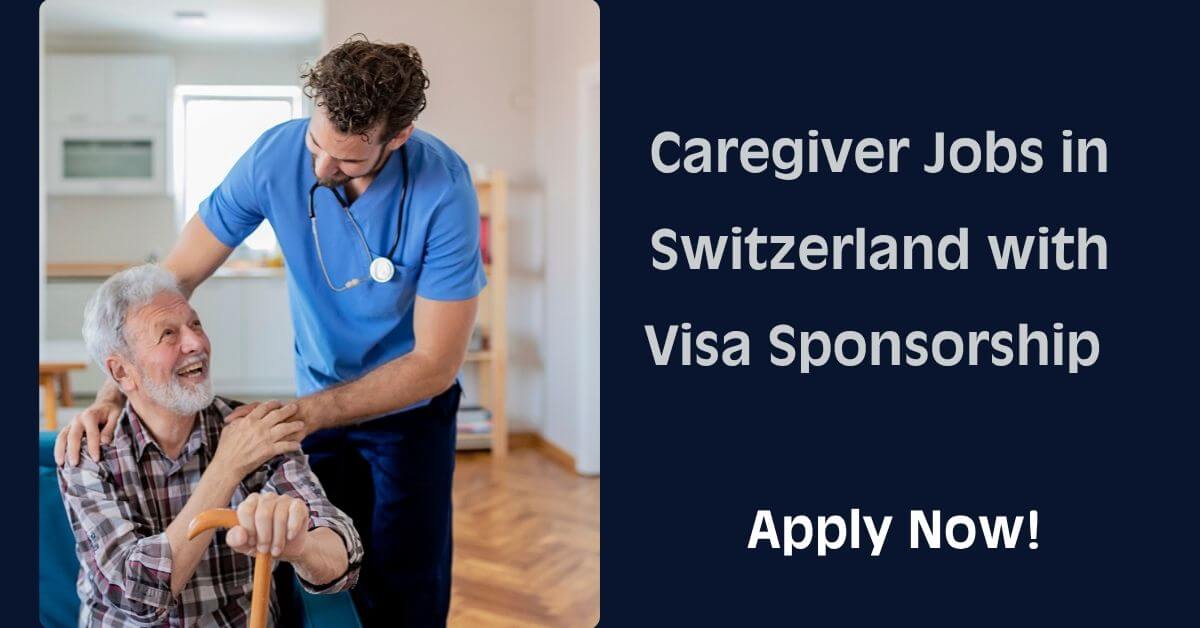If you want to work in Switzerland caring for the elderly, caregiver jobs with visa sponsorship offer a secure path to live and work legally while earning around $20.13 per hour. Many Swiss employers provide training, accommodation support, and additional benefits, making these positions ideal for foreign workers with caregiving experience.
In this guide, we explain eligibility, salary, duties, visa requirements, and benefits everything you need to start your career as a caregiver in Switzerland.
What Are Caregiver Jobs in Switzerland?
Caregivers (also called personal care assistants) help elderly residents maintain independence, manage health routines, and enjoy daily activities. Positions are available in nursing homes, private residences, assisted living facilities, and specialized elderly care centers.
Swiss caregivers provide personal care, meal assistance, documentation, communication, and emergency response, ensuring residents are safe and supported.
Details of Caregiver Jobs in Switzerland:
- Job Title: Caregiver Jobs in Switzerland with Visa Sponsorship
- Country: Switzerland
- Job Type: Full-Time / Part-Time
- Visa Sponsorship: Yes
- Age Limit: 21 years and above
- Education: High school diploma or equivalent
- Language: English
- Experience Required: 1–3 years
- Gender: Male / Female
- Who Can Apply: Any nationality
- Salary: $20 per hour
Duties and Responsibilities
Personal Care
- Bathing, dressing, grooming, and hygiene support
- Assisting residents with incontinence care
- Taking vital signs, weight, and height measurements
Meal Assistance
- Preparing meals and cutting food for easier consumption
- Supporting residents during mealtimes and encouraging healthy habits
Documentation
- Recording care activities and observations
- Reporting health changes to supervisors or nursing staff
Communication
- Engaging with residents for emotional support
- Updating families and supervisors on resident well-being
- Collaborating with nursing and care teams
Task Execution and Emergency Response
- Following residents’ care plans
- Participating in recreational and therapeutic activities
- Responding to emergencies promptly and efficiently
Requirements to Work as a Caregiver in Switzerland
- Work Permit: Non-EU/EFTA workers must secure a Swiss work permit, usually backed by an employer.
- Caregiving Qualification: Nursing diplomas, elderly care certificates, or related experience are preferred.
- Language Skills: Proficiency in English plus German, French, or Italian depending on canton.
- Police Check: Must pass a national police background check to work with vulnerable populations.
- First Aid/CPR Certification: Required for emergency response.
- COVID-19 Vaccinations: Compliance with employer health rules is necessary.
- Additional Checks: Depending on the role, you may need child or disability support clearances.
Pro Tip: Employers value applicants who already have CPR certification and prior caregiving experience, as it speeds up the visa and hiring process.
Benefits of Caregiver Jobs in Switzerland
- Competitive Pay: ~$20.13/hour, higher in cities like Zurich and Geneva
- Visa Sponsorship: Employers assist with legal permits and residence
- Paid Training & E-Learning: Improve caregiving skills and career growth
- Employee Reward Programs: Incentives, bonuses, and recognition for exceptional work
- Vision & Health Insurance: Access to benefits covering eye exams, glasses, and healthcare
- Travel & Relocation Support: Some employers provide assistance for relocating to Switzerland
Salary Expectations
| Level | Estimated Pay | Notes |
|---|---|---|
| Entry-Level | $18–20/hour | For candidates with 1 year experience |
| Mid-Level | $20–22/hour | 2–3 years experience, additional languages |
| Senior / Specialized | $23+/hour | For specialized elderly care or management roles |
How to Apply for Caregiver Jobs in Switzerland
- Search for Jobs: Explore openings via Swiss recruiting firms, employer portals, or job boards.
- Apply for a Role: Submit a resume and tailored cover letter.
- Receive a Job Offer: Ensure the offer includes visa sponsorship.
- Submit Visa Application: Apply for a Swiss work visa at your local embassy or consulate.
- Arrive and Register: After visa approval, obtain your residence permit in Switzerland.
Hyper-local tip: If you plan to work in Zurich or Geneva, highlight multilingual skills and CPR certification to increase hireability.
Conclusion
Caregiver jobs in Switzerland provide foreigners a stable, rewarding career path with visa sponsorship, paid training, and excellent benefits. With proper preparation, required qualifications, and language skills, you can secure a legal work permit and start a fulfilling career supporting the elderly.
Frequently Asked Questions
What is the salary for caregiver jobs in Switzerland?
The estimated salary for caregivers in Switzerland is around $20.13 per hour.
What are the requirements to work as a caregiver in Switzerland?
Requirements include a legal work permit, caregiving qualifications, language skills (German, French, or Italian), national police check, first aid/CPR certificate, COVID-19 vaccinations, and additional checks depending on the job type.






